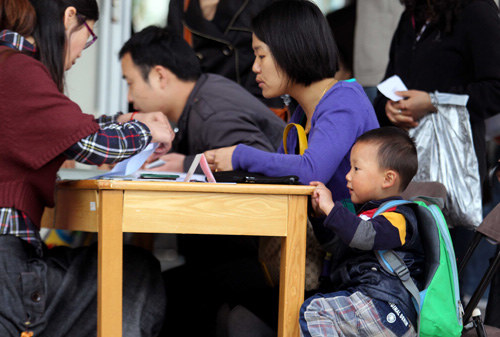|
 |
|
COMPETITIVE REGISTRATION: A boy and his mother register for a public kindergarten in Shanghai after waiting in a long queue on April 21 (LIU YING) |
A man surnamed He, whose son recently graduated from the Beihai Kindergarten, a star public kindergarten in Beijing, told People's Daily that he spent nearly 200,000 yuan ($31,436) on his son's preschool education over the last three years.
Despite the phenomenal price tags of public kindergartens, well-off families covets a spot in these establishments, which enjoy a much longer history, better facilities and well-trained teachers compared to their private counterparts.
A woman surnamed Zhang, a mother of a 4-year-old, told People's Daily that the first stop of her hunt for an ideal kindergarten was a public one next to her community, where the student recruiter talked to her arrogantly and only promised to put her son on a waiting list. The expenses for this kindergarten were 4,000 yuan ($629) per month, roughly equaling the average per-capita monthly salary in Beijing, which was 4,672 yuan ($734) in 2011. After waiting for half a year and using connections to get ahead unsuccessfully, Zhang decided to send her son to an equally expensive private facility. "At least my son can start kindergarten right away," said Zhang.
The Beijing Bokai Intelligence and Inclusive Kindergarten, a private facility with a history of more than 10 years, charges each student a monthly tuition of more than 4,000 yuan. Yin Hongbo, principal of the kindergarten, said that the high charge is used to pay a higher-than-average salary for the teachers, upgrade teaching equipment regularly and maintain the facilities.
According to Yin, the rent and property management fee accounts for a large proportion of its overall operational expenses. "Without any external subsidies, we have to shoulder all the expenses by ourselves," Yin said.
Bokai is far from the most expensive private kindergartens in Beijing. Some private kindergartens with foreign teachers that promise a bilingual environment easily charge a student between 80,000 yuan ($12,574) and 100,000 yuan ($15,717) a year.
Unfair care
Nearly 80 percent of Beijing's prestigious public kindergartens are located in city center districts and a small number of star kindergartens enjoy far better facilities and teachers than other ordinary public kindergartens.
A woman surnamed Cao is a 36-year-old mother living in Tiantongyuan, which has a population of around 900,000 and only one public kindergarten. Her two-and-half-year-old daughter is about to start kindergarten at a private facility this September. The number one concern during Cao's selection of a kindergarten was enough outdoor space, which most private kindergartens in Tiantongyuan lack.
The principal of the private Little Golden Horse Kindergarten, who asked not to be named, told Beijing Review that her kindergarten was not licensed by local authorities due to the lack of a playground.
Located in a four-story residential building, the kindergarten has a tiny fenced-off front yard that is really just an enclosed section of walkway. The more than 100 children have to take turns to engage in outdoor activities one class at a time.
"Among private kindergartens in Tiantongyuan, we are not alone in failing to find proper premises. The number of buildings designed for kindergarten use is very small and they have long been rented out," said the principal of the four-year-old facility.
She said that officials visited her kindergarten after it filed a licensing application to local education authorities.
"Although our facilities do not meet the government requirements for private kindergartens, the inspectors did not require us to close down. But without a license from education authorities, we are not qualified for any government subsidies though actually we are helping the government by providing more kindergarten slots," she said. There are dozens of unlicensed private kindergartens in Tiantongyuan alone.
After paying visits to three kindergartens not far from her home, Cao said she chose the one with the largest outdoor space. "I would not say it has a decent playground, but at least it is larger than the other two," she said.
Ways out
Under the planned economy that was practiced in China until the early 1990s, urban residents in China used to heavily rely on childcare services provided by the government or their employers. During the economic reforms initiated in the 1990s the number of kindergartens run by enterprises shrank sharply as they were either closed down or rented out to individuals running private kindergartens.
| 